Unit3 Could you please clean your room SectionA Grammar Focus-4c 课件(人教新目标版)
文档属性
| 名称 | Unit3 Could you please clean your room SectionA Grammar Focus-4c 课件(人教新目标版) |
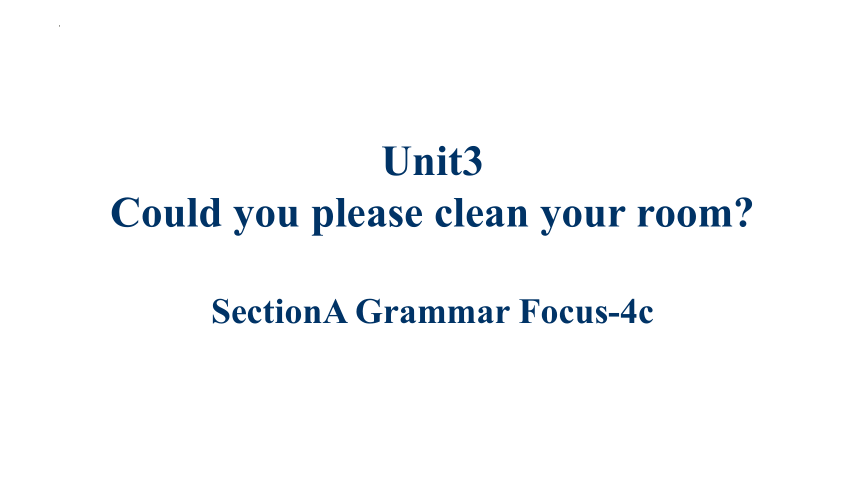
|
|
| 格式 | pptx | ||
| 文件大小 | 343.2KB | ||
| 资源类型 | 试卷 | ||
| 版本资源 | 人教新目标(Go for it)版 | ||
| 科目 | 英语 | ||
| 更新时间 | 2024-03-19 00:00:00 | ||
图片预览

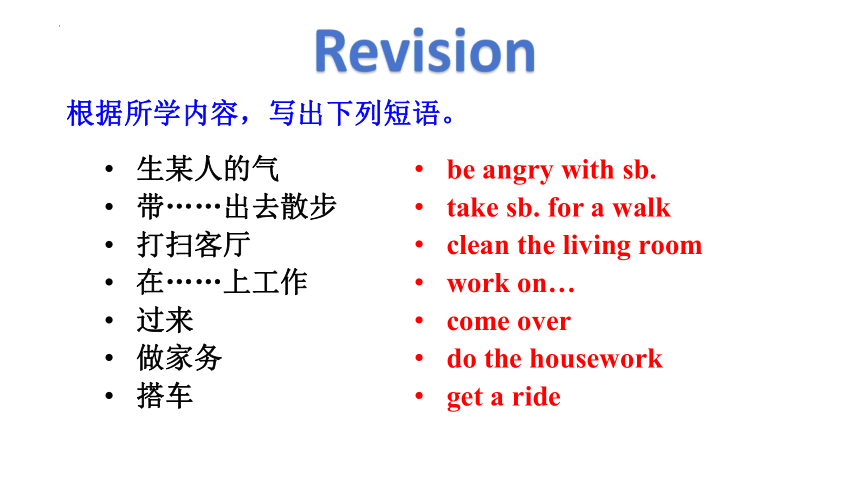
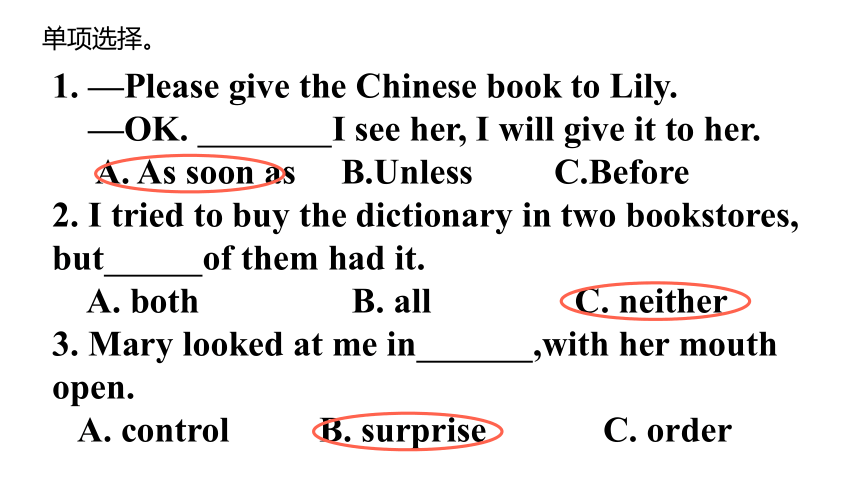

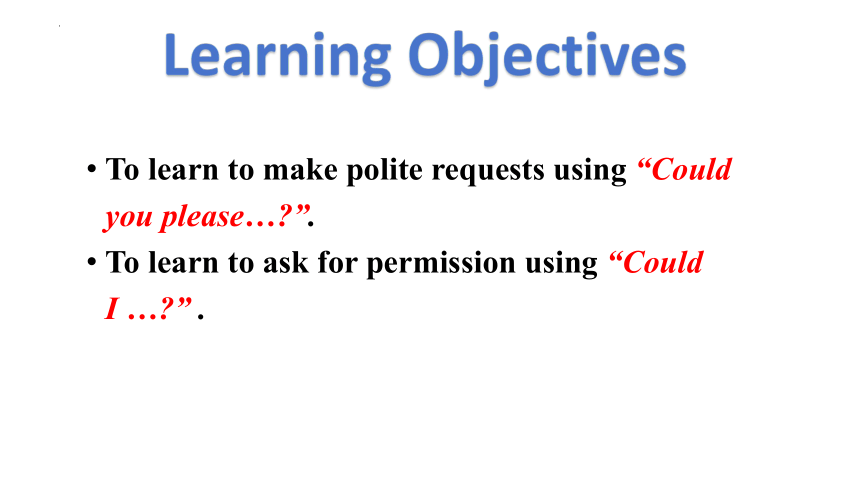
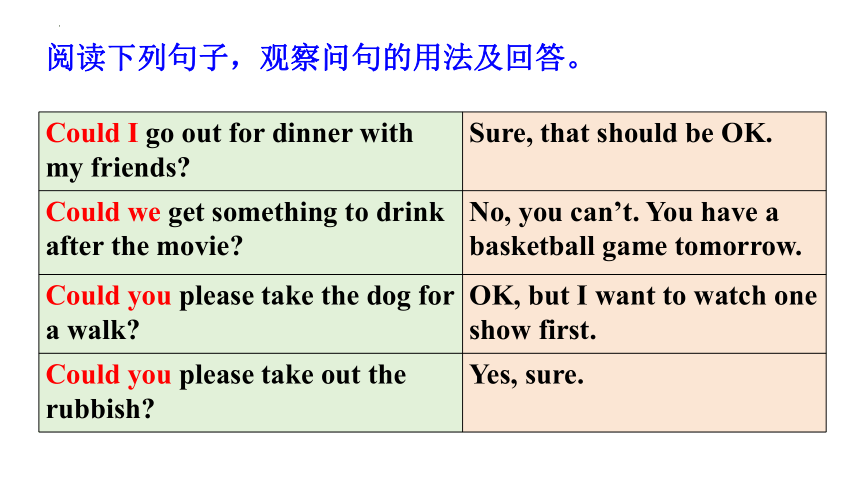
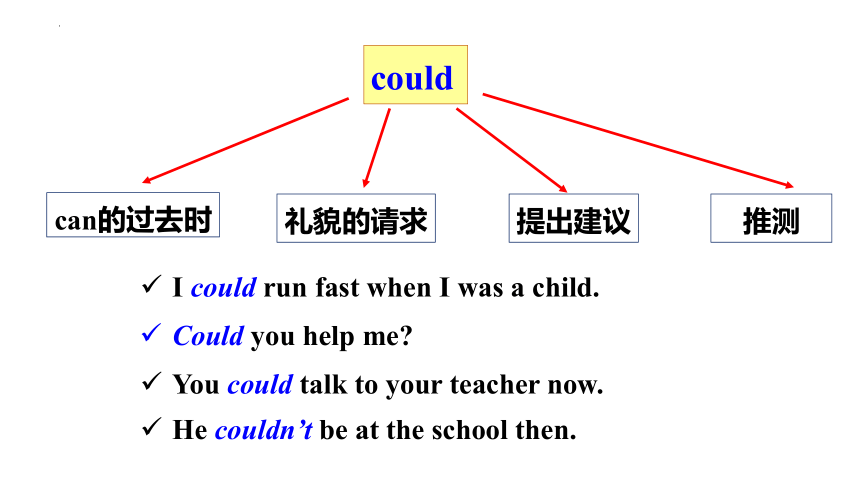
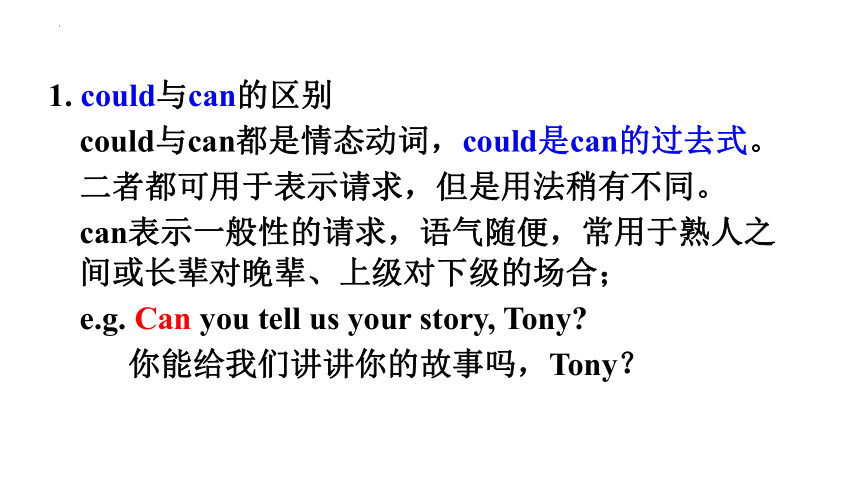
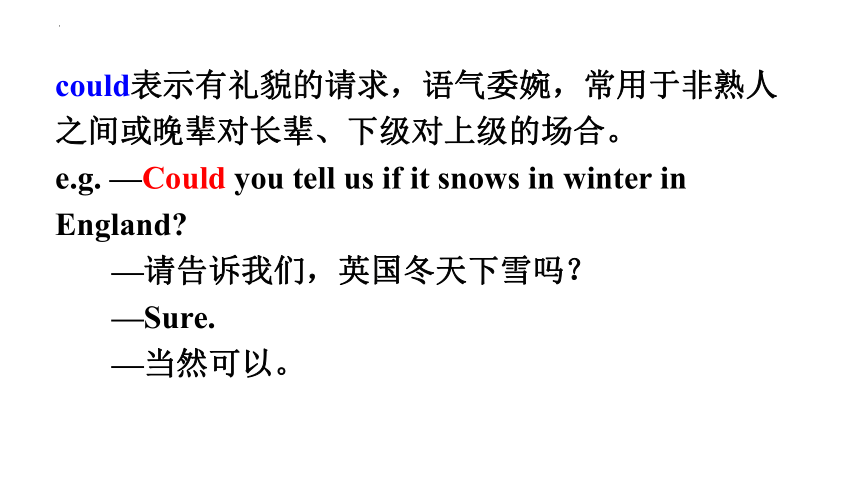
文档简介
(共23张PPT)
Unit3
Could you please clean your room
SectionA Grammar Focus-4c
Revision
根据所学内容,写出下列短语。
生某人的气
带……出去散步
打扫客厅
在……上工作
过来
做家务
搭车
be angry with sb.
take sb. for a walk
clean the living room
work on…
come over
do the housework
get a ride
单项选择。
1. —Please give the Chinese book to Lily.
—OK. I see her, I will give it to her.
A. As soon as B.Unless C.Before
2. I tried to buy the dictionary in two bookstores, but of them had it.
A. both B. all C. neither
3. Mary looked at me in ,with her mouth open.
A. control B. surprise C. order
4. —Could you please help me wash the car
— . I’m studying for my English test.
A. Yes,sure B.Sorry,I can’t C. Not at all
5. —Jim, come out. Let’s go to play basketball.
—Sorry. I’m a math problem.
A. putting on B. turning on C. working on
6. Don’t be angry him .He is only a child.
A. of;at the same time B. on;on time
C. with;all the time
Learning Objectives
To learn to make polite requests using “Could you please… ”.
To learn to ask for permission using “Could I … ” .
Could I go out for dinner with my friends Sure, that should be OK.
Could we get something to drink after the movie No, you can’t. You have a basketball game tomorrow.
Could you please take the dog for a walk OK, but I want to watch one show first.
Could you please take out the rubbish Yes, sure.
阅读下列句子,观察问句的用法及回答。
could
can的过去时
礼貌的请求
提出建议
推测
I could run fast when I was a child.
Could you help me
You could talk to your teacher now.
He couldn’t be at the school then.
1. could与can的区别
could与can都是情态动词,could是can的过去式。
二者都可用于表示请求,但是用法稍有不同。
can表示一般性的请求,语气随便,常用于熟人之间或长辈对晚辈、上级对下级的场合;
e.g. Can you tell us your story, Tony
你能给我们讲讲你的故事吗,Tony?
could表示有礼貌的请求,语气委婉,常用于非熟人之间或晚辈对长辈、下级对上级的场合。
e.g. —Could you tell us if it snows in winter in England
—请告诉我们,英国冬天下雪吗?
—Sure.
—当然可以。
2. could表示请求,语气委婉,显得有礼貌。
Could you please clean your room
你可以打扫你的房间吗?
肯定回答:Yes, I can. /All right./No problem.
Yes, sure. / Yes, of course. /Certainly.
否定回答: Sorry, I can’t. I have to do sth.
3. could表示请求许可,希望得到允许。
Could I go to the movies
我能去看电影吗?
肯定回答:Yes, you can.
Yes, sure. 当然可以。
否定回答:No, you can’t. 不,不行。
1. —Jack, could you please help me take out the trash
—Sorry, ________, mom. I ________ my homework now.
A. couldn’t, am doingB. can’t, am doingC. can’t, do
2. —Excuse me. _______ I sit here
—You'd better not. It's the man' s seat.
A. Must B. Need C. Could
Exercise
3. The clever boy _______ recite so many poems(诗) when he was three.
A. might B. would C. could
4. —Mom, it’s too hot. I swim in the lake with my friends.
—No, you .That’s dangerous.
A. Could; mustn’t B. Must; can’t
C. Should; couldn’t
将以下问句与答语相匹配。
( )1. Could I do my homework later, please
( )2. Dad, could I go to my uncle’s house after school
tonight
A. Yes, sure. I’ll be there on time.
B. OK, but you must give it back next week.
C. No, you can’t. Do it now.
D. Sorry, I need it to make some important calls.
E. Yes, of course you can. But don’t come home late.
C
E
( )3. Could you come and help with the party
( )4. Could I borrow this book
( )5. Could I use your phone
A. Yes, sure. I’ll be there on time.
B. OK, but you must give it back next week.
C. No, you can’t. Do it now.
D. Sorry, I need it to make some important calls.
E. Yes, of course you can. But don’t come home late.
A
B
D
4a
Write R for requests and P for permission. Then match each one with the correct response.
1. ___ Could I hang out with my friends after the movie
2. ___ Could you please pass me the salt
3. ___ Could I borrow that book
4. ___ Could you help me do the dishes
5. ___ Could you lend me some money
a. Yes, here you are.
b. Hmm. How much do you need
c. Yes, sure. No problem. I finished reading it last night.
d. Yes, but don’t come back too late.
e. No, I can’t. I cut my finger and I’m trying not to get it wet.
hang out with sb.
和某人闲逛
pass sb. sth.
=pass sth. to sb.把某物递给某人
borrow sth. from sb
lend sb sth.=lend sth. to sb
词汇 含义及用法 搭配 / 例句
borrow “借入”,把本来不属于自己的东西借来暂时使用 borrow sth.(from sb.)
e.g. You can borrow a book from the library.
lend “借出”,把属于自己的东西借给别人暂时使用,常与介词to连用,也可以跟双宾语。 lend sb. sth.
lend sth. to sb.
e.g. He’s going to lend his bike to Tom.
borrow, lend
4a
Write R for requests and P for permission. Then match each one with the correct response.
1. ___ Could I hang out with my friends after the movie
2. ___ Could you please pass me the salt
3. ___ Could I borrow that book
4. ___ Could you help me do the dishes
5. ___ Could you lend me some money
a. Yes, here you are.
b. Hmm. How much do you need
c. Yes, sure. No problem. I finished reading it last night.
d. Yes, but don’t come back too late.
e. No, I can’t. I cut my finger and I’m trying not to get it wet.
P
R
P
R
R
4b
Fill in the blanks in the conversation.
A: I hate to ________ chores.
B: Well, I hate some chores too, but I like other chores.
A: Really Great! ________ I ask you to ________ me with some chores then
B: What do you need help with
A: ________ you please ________ my clothes for me
B: I don’t want to do that! It’s boring!
憎恨,厌恶
hate to do sth. 讨厌做某事(一次性的行为或特定情况下的厌恶)
hate doing sth.对某种行为长期性的厌恶,不喜欢反复发生的行为。
do
Could
help
Could
fold
A: OK. Then ______ you _______ do the dishes for me
B: Sure, no problem. But _______ we go to the movies after that
A: Sure. I’ll finish my homework while you help me with the dishes. Then we can go to the movies.
could
please
could
If we are going to have a camping trip, what should we do before the trip
take a big cloth
bring a tent
take an umbrella
take a rubbish bag
buy some drinks
buy some food
bring a camera
prepare some programs
4c
Make a list of things your group needs to do for a camping trip. Then discuss who will do them and complete the chart.
A: Could you please bring a tent, Liu Chang
B: Sure. And could you please…
C: Sorry, I can’t. I have to …
To-do list Name
bring a tent Liu Chang
Homework
1. Make a conversation between your mother and you, using the sentence pattern “Could you please … Could I … ”.
2. Preview the new words and expressions.
Unit3
Could you please clean your room
SectionA Grammar Focus-4c
Revision
根据所学内容,写出下列短语。
生某人的气
带……出去散步
打扫客厅
在……上工作
过来
做家务
搭车
be angry with sb.
take sb. for a walk
clean the living room
work on…
come over
do the housework
get a ride
单项选择。
1. —Please give the Chinese book to Lily.
—OK. I see her, I will give it to her.
A. As soon as B.Unless C.Before
2. I tried to buy the dictionary in two bookstores, but of them had it.
A. both B. all C. neither
3. Mary looked at me in ,with her mouth open.
A. control B. surprise C. order
4. —Could you please help me wash the car
— . I’m studying for my English test.
A. Yes,sure B.Sorry,I can’t C. Not at all
5. —Jim, come out. Let’s go to play basketball.
—Sorry. I’m a math problem.
A. putting on B. turning on C. working on
6. Don’t be angry him .He is only a child.
A. of;at the same time B. on;on time
C. with;all the time
Learning Objectives
To learn to make polite requests using “Could you please… ”.
To learn to ask for permission using “Could I … ” .
Could I go out for dinner with my friends Sure, that should be OK.
Could we get something to drink after the movie No, you can’t. You have a basketball game tomorrow.
Could you please take the dog for a walk OK, but I want to watch one show first.
Could you please take out the rubbish Yes, sure.
阅读下列句子,观察问句的用法及回答。
could
can的过去时
礼貌的请求
提出建议
推测
I could run fast when I was a child.
Could you help me
You could talk to your teacher now.
He couldn’t be at the school then.
1. could与can的区别
could与can都是情态动词,could是can的过去式。
二者都可用于表示请求,但是用法稍有不同。
can表示一般性的请求,语气随便,常用于熟人之间或长辈对晚辈、上级对下级的场合;
e.g. Can you tell us your story, Tony
你能给我们讲讲你的故事吗,Tony?
could表示有礼貌的请求,语气委婉,常用于非熟人之间或晚辈对长辈、下级对上级的场合。
e.g. —Could you tell us if it snows in winter in England
—请告诉我们,英国冬天下雪吗?
—Sure.
—当然可以。
2. could表示请求,语气委婉,显得有礼貌。
Could you please clean your room
你可以打扫你的房间吗?
肯定回答:Yes, I can. /All right./No problem.
Yes, sure. / Yes, of course. /Certainly.
否定回答: Sorry, I can’t. I have to do sth.
3. could表示请求许可,希望得到允许。
Could I go to the movies
我能去看电影吗?
肯定回答:Yes, you can.
Yes, sure. 当然可以。
否定回答:No, you can’t. 不,不行。
1. —Jack, could you please help me take out the trash
—Sorry, ________, mom. I ________ my homework now.
A. couldn’t, am doingB. can’t, am doingC. can’t, do
2. —Excuse me. _______ I sit here
—You'd better not. It's the man' s seat.
A. Must B. Need C. Could
Exercise
3. The clever boy _______ recite so many poems(诗) when he was three.
A. might B. would C. could
4. —Mom, it’s too hot. I swim in the lake with my friends.
—No, you .That’s dangerous.
A. Could; mustn’t B. Must; can’t
C. Should; couldn’t
将以下问句与答语相匹配。
( )1. Could I do my homework later, please
( )2. Dad, could I go to my uncle’s house after school
tonight
A. Yes, sure. I’ll be there on time.
B. OK, but you must give it back next week.
C. No, you can’t. Do it now.
D. Sorry, I need it to make some important calls.
E. Yes, of course you can. But don’t come home late.
C
E
( )3. Could you come and help with the party
( )4. Could I borrow this book
( )5. Could I use your phone
A. Yes, sure. I’ll be there on time.
B. OK, but you must give it back next week.
C. No, you can’t. Do it now.
D. Sorry, I need it to make some important calls.
E. Yes, of course you can. But don’t come home late.
A
B
D
4a
Write R for requests and P for permission. Then match each one with the correct response.
1. ___ Could I hang out with my friends after the movie
2. ___ Could you please pass me the salt
3. ___ Could I borrow that book
4. ___ Could you help me do the dishes
5. ___ Could you lend me some money
a. Yes, here you are.
b. Hmm. How much do you need
c. Yes, sure. No problem. I finished reading it last night.
d. Yes, but don’t come back too late.
e. No, I can’t. I cut my finger and I’m trying not to get it wet.
hang out with sb.
和某人闲逛
pass sb. sth.
=pass sth. to sb.把某物递给某人
borrow sth. from sb
lend sb sth.=lend sth. to sb
词汇 含义及用法 搭配 / 例句
borrow “借入”,把本来不属于自己的东西借来暂时使用 borrow sth.(from sb.)
e.g. You can borrow a book from the library.
lend “借出”,把属于自己的东西借给别人暂时使用,常与介词to连用,也可以跟双宾语。 lend sb. sth.
lend sth. to sb.
e.g. He’s going to lend his bike to Tom.
borrow, lend
4a
Write R for requests and P for permission. Then match each one with the correct response.
1. ___ Could I hang out with my friends after the movie
2. ___ Could you please pass me the salt
3. ___ Could I borrow that book
4. ___ Could you help me do the dishes
5. ___ Could you lend me some money
a. Yes, here you are.
b. Hmm. How much do you need
c. Yes, sure. No problem. I finished reading it last night.
d. Yes, but don’t come back too late.
e. No, I can’t. I cut my finger and I’m trying not to get it wet.
P
R
P
R
R
4b
Fill in the blanks in the conversation.
A: I hate to ________ chores.
B: Well, I hate some chores too, but I like other chores.
A: Really Great! ________ I ask you to ________ me with some chores then
B: What do you need help with
A: ________ you please ________ my clothes for me
B: I don’t want to do that! It’s boring!
憎恨,厌恶
hate to do sth. 讨厌做某事(一次性的行为或特定情况下的厌恶)
hate doing sth.对某种行为长期性的厌恶,不喜欢反复发生的行为。
do
Could
help
Could
fold
A: OK. Then ______ you _______ do the dishes for me
B: Sure, no problem. But _______ we go to the movies after that
A: Sure. I’ll finish my homework while you help me with the dishes. Then we can go to the movies.
could
please
could
If we are going to have a camping trip, what should we do before the trip
take a big cloth
bring a tent
take an umbrella
take a rubbish bag
buy some drinks
buy some food
bring a camera
prepare some programs
4c
Make a list of things your group needs to do for a camping trip. Then discuss who will do them and complete the chart.
A: Could you please bring a tent, Liu Chang
B: Sure. And could you please…
C: Sorry, I can’t. I have to …
To-do list Name
bring a tent Liu Chang
Homework
1. Make a conversation between your mother and you, using the sentence pattern “Could you please … Could I … ”.
2. Preview the new words and expressions.
同课章节目录
- Unit 1 What's the matter?
- Section A
- Section B
- Unit 2 I'll help to clean up the city parks.
- Section A
- Section B
- Unit 3 Could you please clean your room?
- Section A
- Section B
- Unit 4 Why don't you talk to your parents?
- Section A
- Section B
- Unit 5 What were you doing when the rainstorm came
- Section A
- Section B
- Review of Units 1-5
- Unit 6 An old man tried to move the mountains.
- Section A
- Section B
- Unit 7 What's the highest mountain in the world?
- Section A
- Section B
- Unit 8 Have you read Treasure Island yet?
- Section A
- Section B
- Unit 9 Have you ever been to a museum?
- Section A
- Section B
- Unit 10 I've had this bike for three years.
- Section A
- Section B
